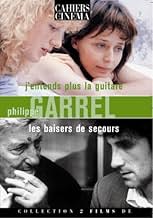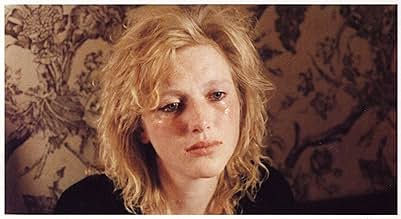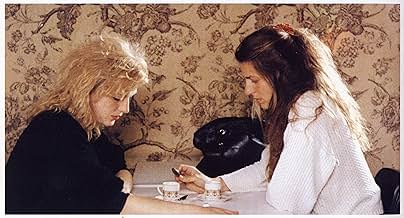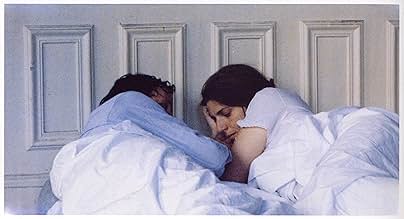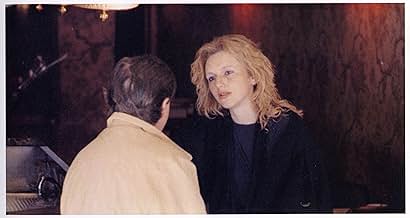Ajouter une intrigue dans votre langueFor those who were young, living under the delusions of love and soft drugs in Paris, May 1968 - even if the guitar is still playing, they can't hear it any longer.For those who were young, living under the delusions of love and soft drugs in Paris, May 1968 - even if the guitar is still playing, they can't hear it any longer.For those who were young, living under the delusions of love and soft drugs in Paris, May 1968 - even if the guitar is still playing, they can't hear it any longer.
- Récompenses
- 1 victoire et 3 nominations au total
Histoire
Le saviez-vous
- ConnexionsFeatured in Cinéma, de notre temps: Philippe Garrel, artiste (1998)
Commentaire à la une
'J'entends plus la guitare' is dedicated to the memory of Nico, the Swedish model and actress who was director Garrel's muse, most famous as the blonde Marcello meets at the castle party in 'La Dolce Vita', and the singer with the haunted monotone on the Velvet Underground's extraordinary 'Banana' album. the heroine of the film is a blonde German who, like Nico, turns to drugs - her last appearance is marked by a pun on heroine/heroin (the Velvets' most famous song), and the Velvet-esque guitar of the title is no longer heard by the hero, or the director. The female is usually signalled in Garrel's films by music, as if music itself was somehow a feminine principle - the 'Je', therefore, is plausibly the director's, offering the film as a mea culpa, blaming himself for a death triggered by pure male egotism. Gerard is one of the least likeable characters in European cinema, an emotional vampire who needs to suck the emotional blood out of countless women, leaving them diminished, empty, to save himself from a similar fate.
Perhaps, again in tribute to Nico, Garrel's usual stylistic austerity is filtered through a Warhol-like sensibility. this is one of the most gruelling films I have ever squirmed through, in terms of style - long, punishing takes in shabby, bare environments of people either talking self-serving philosophical twaddle, or, worse, little at all, the peeling of the walls against which the characters are framed speaking more eloquently for the emotional and imaginative inertia; takes that are so long and unadorned that the characters (or actors) arent' allowed to hide, and the various mannerisms or tics or little theatrical heightenings are exposed for what they are, not as accretions to be stripped away to reveal some real 'truth', but as part of the truth that we can never strip them away, never truly give ourselves to another - and in terms of content.
the film begins as a stereotypical French film, with two couples frustrated in love: one is in love with another but won't give him a child; one refuses to tell his lover he loves her because she doesn't know what the word means. The men begin the first of their discussions about their relations to the women, one grounded in culture, the other in experience. One could argue this as the philosophical base of the film.
In any case, things go from bad to worse, people start leaving each other, losing their children, sleeping with prostitutes or older, abused women. What is unusual in this film is that 'seedy' subject matter usually treated luridly or with too much downbeat detail, is here represented in a flat, monotonous visual style, and through a disarming ellipsis that doesn't warn the viewer that five minutes or five years have passed. This is the closest cinema has gotten to the numbed, unsensational texture of life itself. To even ask entertainment of it is besides the point.
Perhaps, again in tribute to Nico, Garrel's usual stylistic austerity is filtered through a Warhol-like sensibility. this is one of the most gruelling films I have ever squirmed through, in terms of style - long, punishing takes in shabby, bare environments of people either talking self-serving philosophical twaddle, or, worse, little at all, the peeling of the walls against which the characters are framed speaking more eloquently for the emotional and imaginative inertia; takes that are so long and unadorned that the characters (or actors) arent' allowed to hide, and the various mannerisms or tics or little theatrical heightenings are exposed for what they are, not as accretions to be stripped away to reveal some real 'truth', but as part of the truth that we can never strip them away, never truly give ourselves to another - and in terms of content.
the film begins as a stereotypical French film, with two couples frustrated in love: one is in love with another but won't give him a child; one refuses to tell his lover he loves her because she doesn't know what the word means. The men begin the first of their discussions about their relations to the women, one grounded in culture, the other in experience. One could argue this as the philosophical base of the film.
In any case, things go from bad to worse, people start leaving each other, losing their children, sleeping with prostitutes or older, abused women. What is unusual in this film is that 'seedy' subject matter usually treated luridly or with too much downbeat detail, is here represented in a flat, monotonous visual style, and through a disarming ellipsis that doesn't warn the viewer that five minutes or five years have passed. This is the closest cinema has gotten to the numbed, unsensational texture of life itself. To even ask entertainment of it is besides the point.
- the red duchess
- 2 août 2001
- Permalien
Meilleurs choix
Connectez-vous pour évaluer et suivre la liste de favoris afin de recevoir des recommandations personnalisées
Détails
Box-office
- Montant brut aux États-Unis et au Canada
- 12 876 $US
- Montant brut mondial
- 12 876 $US
- Durée1 heure 38 minutes
- Couleur
- Rapport de forme
- 1.66 : 1
Contribuer à cette page
Suggérer une modification ou ajouter du contenu manquant

Lacune principale
By what name was J'entends plus la guitare (1991) officially released in Canada in English?
Répondre
